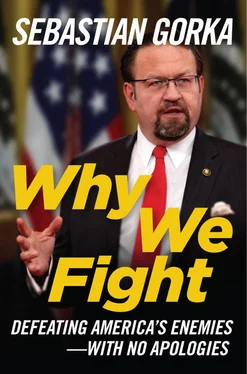China wants to be the most powerful state in the world. To achieve that, it must dethrone America. If that happens, international affairs will be dominated not by a nation founded on the principle of “unalienable rights” derived from our Creator, but by a communist dictatorship run by a man who recently had himself made premier for life. Freedom-loving peoples cannot allowed that to happen. Fortunately, the current president of the United States understands the threat posed by Beijing.
WAR IS WAR: BACK TO THE FUTURE
As the empirical data show, war is most often “irregular” and “unconventional.” Given America’s capacity to maintain an overwhelming advantage in the conventional military arena, our adversaries will continue to develop and employ irregular modes of attack. Although not all of these are revolutionary, or even novel, they are already proving effective. The sooner our strategists and policymakers develop relevant counters and hone our own indirect and non-kinetic modes of attack, the more able we will be to secure our republic and ensure the security of all Americans and our friends.
America’s Warriors
Whittaker Chambers
One Man against the World

Not all heroes wear a uniform or carry a badge and a gun. Some are short, overweight, and desperately unhealthy civilians who nevertheless risk it all and are true heroes. This is a story about just such a hero.
It is said of Americans that we are a forgetful nation, that our historical attention span is short, that for us a century ago may as well be deepest antiquity, and that we have a reflexive disregard for the past that undermines our capacity to learn from the mistakes, trials, and victories of others. This is demonstrably true when it comes to our national experience during the Cold War, for the lessons we learnt then seem nigh forgotten just a handful of decades later.
One American who is owed a great debt by this nation but whose name is almost unknown among the younger generations is Whittaker Chambers. [1] Chambers’ given name was Jay Vivian, but he was known as Whittaker, his mother’s maiden name.
He didn’t fight our mortal enemies on far away battlefields. He was never wounded in combat or given a Purple Heart by a thankful nation. In fact, he was pilloried and vilified by the postwar ruling elite, accused of unspeakable things for one reason and one reason alone: he stood up to that elite and revealed the rot at its core. He gave the world incontrovertible evidence that the West was in mortal peril, that agents of a totalitarian ideology that wished to destroy or enslave us had reached the highest levels of the elite. But despite being ostracized and smeared, he stood his ground, faced these traitors openly, and wrote a book that remains one of the few truly life-changing works of its kind today.
Chambers was born in Philadelphia and grew up in Brooklyn and Long Island. [2] The following chronology is based in part on the excellent introductory lecture “Whittaker Chambers’ Witness for the Twenty-first Century” by Dr. Greg Forster, posted by the Acton Institute: https://www.youtube.com/watch?v=mNlTigcvcpM .
An abusive father and a psychologically unstable mother made his childhood particularly difficult, and he left home early, ending up as a manual laborer in the District of Columbia before enrolling at Columbia University, where he was recognized by his peers and professors for his sharp mind and impressive writing talent. At the same time, he found solace in the company of the Quakers, a spiritual people centered around a deep commitment to community.
In time, the idealistic Chambers volunteered for a Quaker mission to the Soviet Union, excited to be part of a team that would bring aid to those less fortunate than himself and his peers. But he found himself shunned by the Quakers when they read his earlier student writings in which he had extolled the virtues of being an atheist, writings that some even deemed to be blasphemous. The rejection by his new faith family deeply affected Chambers, who subsequently dropped out of college, a doubly demoralized young man who had finally found fellowship and recognition only to lose both.
Shortly after his decision to leave the life that had given him solace and a sense of belonging, his brother, Richard, committed suicide, sending him into a period of crisis. This was the moment when Whittaker Chambers searched for a mission, a vocation, a crusade that would allow him to crush a system that he thought deserved crushing—a system that had rejected him and made his brother end his life. Communism was the ideology that perfectly matched the young man’s need to rebel. It became his new “godless religion,” and he joined the Communist Party.
It was 1925, and Chambers saw in the fresh, new Soviet regime the model for sabotaging the ruling elite, bringing equality to America’s shores, destroying capitalism, and building a society in which justice reigned.
At the beginning his activities were public, writing and editing for Marxist organs like the Daily Worker . But as awareness of the communist threat grew, so did the need for secrecy, and Chambers embarked on a six-year odyssey as a covert communist, a subversive agent of the international conspiracy that served the Kremlin and whose goal was the destruction of the West and democracies everywhere.
Chambers had one of the most important jobs: managing the secret lines of communication between the communist undergrounds in Europe and the United States. He eventually became the agent who transported the Kremlin’s instructions to Soviet moles in the American government and collected the classified materials they had stolen for transmission to Moscow.
Whittaker Chambers shrewdly constructed a new place for himself in American society as an ostensibly patriotic, middle-class family man. After a few years of effective dissembling, he was rewarded with the enviable position of senior editor of Time magazine. All the while he was at the hub of Soviet spying in the United States and knew all the key spies and covert agents of influence.
But this mission would not last forever. Chambers was inevitably challenged by the reality of what Karl Marx’s philosophy was doing to people who got in its way. First, there were the international reports of labor camps and the mass denial of the human rights and dignity of anyone deemed to be an “undesirable.” Then came the vicious and deadly purges fueled by Stalin’s paranoia, which resulted in the executions of thousands and thousands of human beings as “enemies of the state,” not for any crime, but for being disagreeable to the the general secretary or his underlings.
This death toll was not restricted to the territory of the USSR and the slave nations in its iron grip. Otherwise loyal underground agents of Moscow, people Chambers knew personally, were suddenly kidnapped or simply disappeared from his network completely and were never heard from again. The paranoia also ended the lives of those who, like Chambers, had been most dedicated to the cause of communism.
This was when he realized that he knew too much. So capricious were the men in the Kremlin that he might be suspected of disloyalty or simply fall out of favor at any time. If that happened, he and even his family would be targeted. So in 1938, on the eve of World War II, Chambers took a momentous decision that would change his life, the lives of his loved ones, and the course of American history and the Cold War. He cut all ties with the communist network to which he had dedicated his life and went into hiding with his family. He left a treasure trove of documents collected from his covert assets with a relative to keep as leverage against any attempt against himself or his family. And in a desperate search for clarity about what to do next, he returned to prayer, asking for God’s guidance.
Читать дальше













